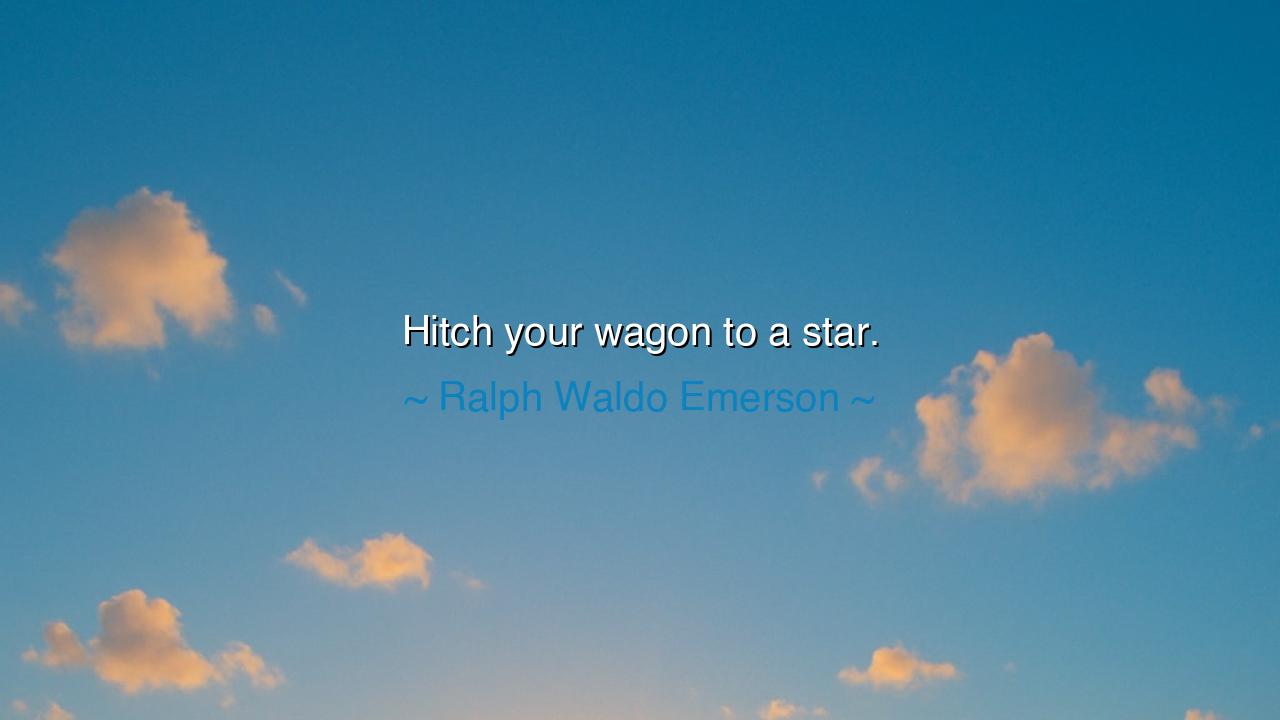
Hitch your wagon to a star.






In the words of Ralph Waldo Emerson, sage of Concord and voice of the transcendental spirit, we hear a call to greatness: “Hitch your wagon to a star.” These words are not meant to be taken as simple metaphor, but as a summons to live beyond the limits of the ordinary. The wagon is the life we build with our own hands—humble, practical, grounded in earth. The star is the higher vision, the divine ideal, the dream that dwells far above our reach. Emerson tells us: fasten the two together. Let your everyday labors be yoked to eternal purpose, so that the weight of your work is lifted by the light of heaven.
The origin of this saying lies in Emerson’s philosophy of self-reliance and aspiration. Living in a time when America was still forging its destiny, he sought to teach that man must not grovel in mediocrity nor be content with survival. To “hitch one’s wagon to a star” was his way of declaring that the individual should not live for small gains, but tie his life to principles of truth, beauty, justice, and vision. For when we reach toward something higher than ourselves, even if we never fully touch it, the effort transforms our lives into something noble.
History provides shining examples of this wisdom. Consider Florence Nightingale, who might have lived a quiet life in wealth and comfort. Instead, she hitched her wagon to the star of service and healing. Against opposition, ridicule, and hardship, she carried her vision into the filth of battlefield hospitals, where she revolutionized medicine and saved countless lives. The wagon of her daily labor was heavy with suffering, yet it moved forward because it was yoked to a star of compassion that never dimmed.
The ancients, too, spoke of this union between earthly toil and celestial vision. Homer’s Odysseus, weary and battered, always steered by the stars as he sought his way home. The stars guided his ship across uncertain seas, just as noble ideals guide our wagons across the rough roads of life. Without the star, the wagon wanders aimlessly; without the wagon, the star remains an unreachable dream. Emerson reminds us that true greatness comes only when the two are bound together.
The meaning of Emerson’s words is both poetic and practical. He does not tell us to abandon the wagon, to live in dreams without action. Nor does he tell us to drag the wagon aimlessly upon the ground of habit and necessity. He commands us to yoke the one to the other—to let our ideals lift our labors, and our labors bring our ideals into form. In this union, life becomes both purposeful and enduring, for the star draws us forward when our arms grow weary.
The lesson for us is clear: aim high. Do not live only for bread, comfort, or praise. Choose a star—an ideal worthy of your life—and bind your daily tasks to it. If your star is wisdom, then let your reading, writing, and reflection be your wagon. If your star is justice, let your work in community and law be the wagon you hitch to it. If your star is love, let every act of kindness be the wheel that turns. In this way, your life will rise beyond the dust, guided always by a light greater than yourself.
Practical counsel is this: take time to name your star. Write it down, make it plain, and keep it always before you. Then examine your wagon—the habits, duties, and actions of your life—and ask: Are they yoked to my star? If not, change your path until they align. Day by day, the humble wagon will move, and though you may never touch the star, you will travel in its light, and that light will sanctify your journey.
Thus, Emerson’s words ring across the centuries as both inspiration and command: “Hitch your wagon to a star.” They call us to dream, but not to drift; to labor, but not to lose sight of heaven. Let your star be noble, let your wagon be steady, and your life will shine as a testimony that man was not born merely to crawl upon the earth, but to walk with his eyes lifted toward the eternal skies.






AAdministratorAdministrator
Welcome, honored guests. Please leave a comment, we will respond soon